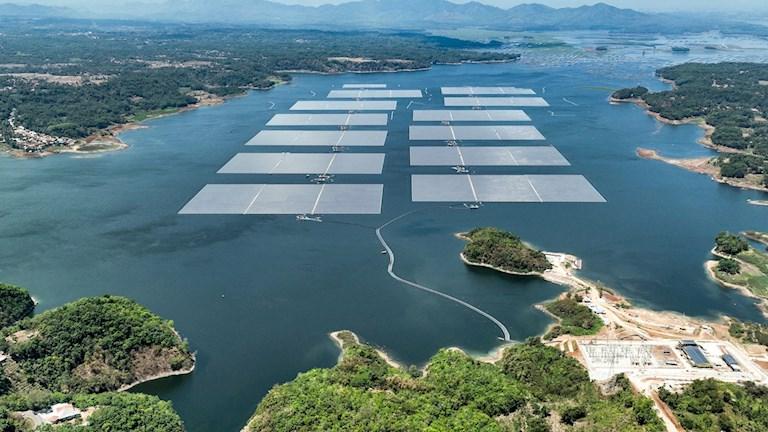ABB shores up reliable power supply at Southeast Asia’s largest floating solar plant

- Cirata floating solar power plant will generate 192 megawatt peak (MWp) of clean energy, enough to power 50,000 homes
- ABB’s UniGear ZS1 switchgear, equipped with Relion® protection relays, ensures the reliability of its electricity supply
- Project will avoid more than 200,000 tons of carbon dioxide emissions annually and contribute to Indonesia’s target of 23 percent renewable energy generation by 2025
ABB has delivered a state-of-the-art distribution solution to ensure Southeast Asia’s largest floating solar power plant can deliver reliable, clean energy to 50,000 Indonesian homes. The new 250-hectare floating solar power plant in the Cirata Reservoir in West Java, Indonesia, was recently inaugurated by the Indonesian President, Joko Widodo.
It is one of a growing number of floating solar installations around the world that are building on existing hydropower plants to ensure efficient and consistent electricity generation. A study in the journal Nature calculated that covering just 10 percent of the world’s hydropower reserves with floating solar panels could produce as much electricity as all of the world’s fossil fuel plants combined1. In Indonesia, integrating rising levels of variable renewables into its power system is important to hitting its target of 23 percent renewable power generation by 20252.
The Cirata plant project is a collaboration between the Indonesian government, through PT PLN Nusantara Power, and Abu Dhabi-based renewable energy group Masdar. Working in collaboration with on-site engineers, ABB has successfully installed, tested, and commissioned medium-voltage (MV) primary air-insulated switchgear (AIS) at Phase 1 of the project, which has a capacity of 192 megawatt peak (MWp), almost 30 times that of Europe’s largest floating solar park in the Alqueva reservoir in Portugal.
Its anchoring and mooring, which reach depths of 100 meters in the Cirata Dam, are the deepest in the world and the operation of the plant will avoid 214,000 tons of carbon dioxide emissions annually.
“We are proud to be part of this project, which is not only strategically important for Indonesia but also sets an example for other global economies that are looking to bolster their decarbonization plans with floating solar technology,” said Ken Yap, Commercial Vice President at ABB’s Electrification business in Indonesia.
“Our state-of-the-art technologies are integral to the reliable delivery of renewable energy from the first utility-scale Indonesian floating photovoltaic (PV) power plant and the largest in Southeast Asia. Robust distribution infrastructure is crucial to the success of the country’s plan to increase the renewable portion of its energy mix and we are excited to be part of that journey”.
ABB’s solution includes 17 units of MV primary AIS UniGear ZS1 with Relion® protection relays, to control, protect and isolate the electrical equipment, ensuring the reliability of the electricity supply. It requires minimum maintenance, optimizing the total cost of ownership. Furthermore, the Relion® product family’s feeder protection and control relays, REF615, increase safety as they can be remotely operated and controlled. The switchgear is easily extendable as the plant’s requirements continue to grow in the future.
At present, renewables account for just 14 percent of Indonesia’s energy mix. The advantage of floating PV is that the modules are kept cooler by the surrounding water, which increases their efficiency. The Indonesian government is planning a further 60 floating PV installations like the Cirata plant as it pursues a target of 23 percent renewable power generation by 2025, and 31 percent by 2050. With 100 reservoirs and 521 natural lakes across the country, there is huge potential to use this project as a blueprint to replicate more floating solar power plants across the region, and around the world.
1) Floating solar power could help fight climate change - let's get it right [nature.com] 2) Scaling up renewables in the Java-Bali power system: A case study - Analysis - IEA

